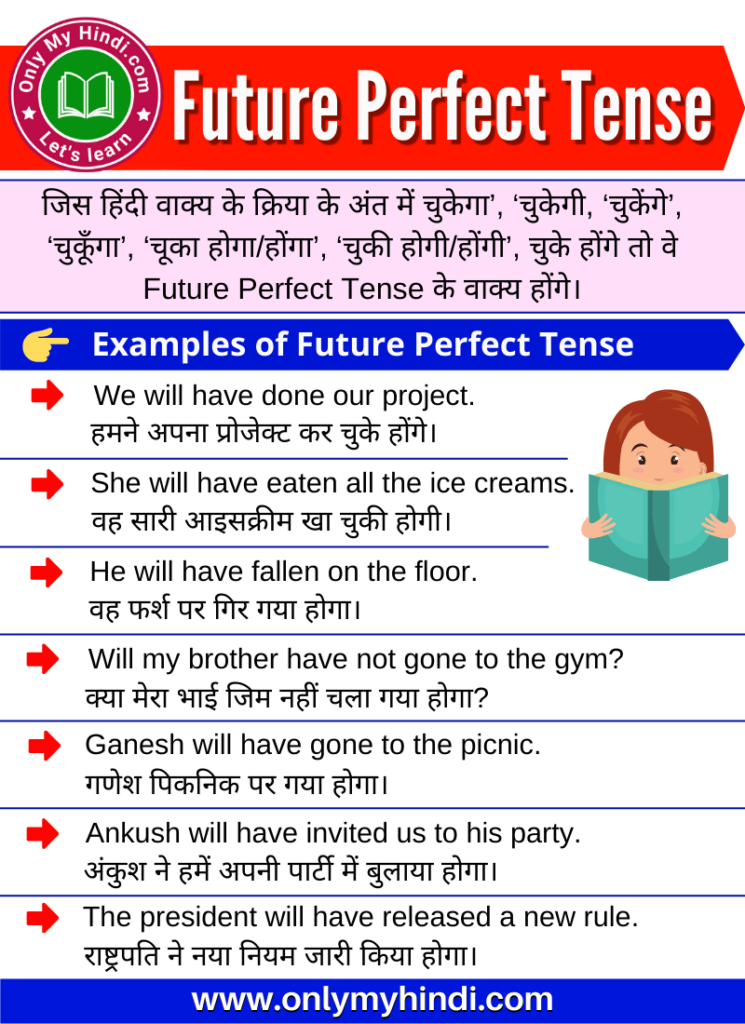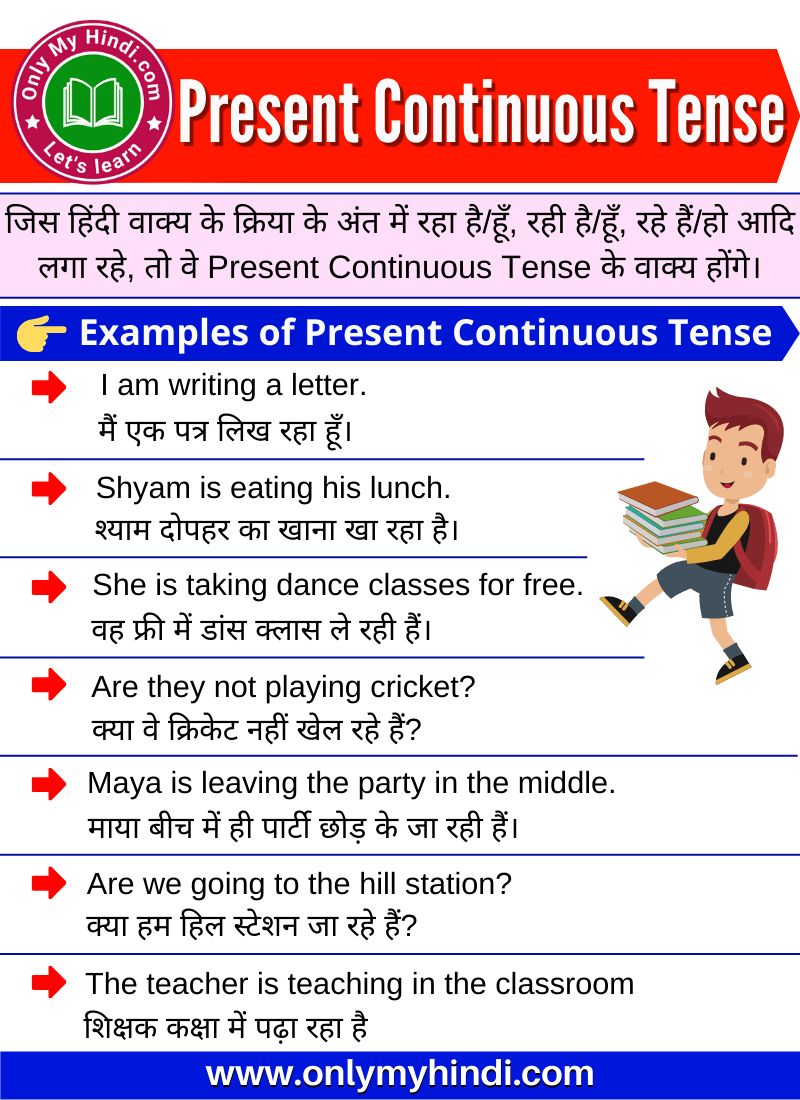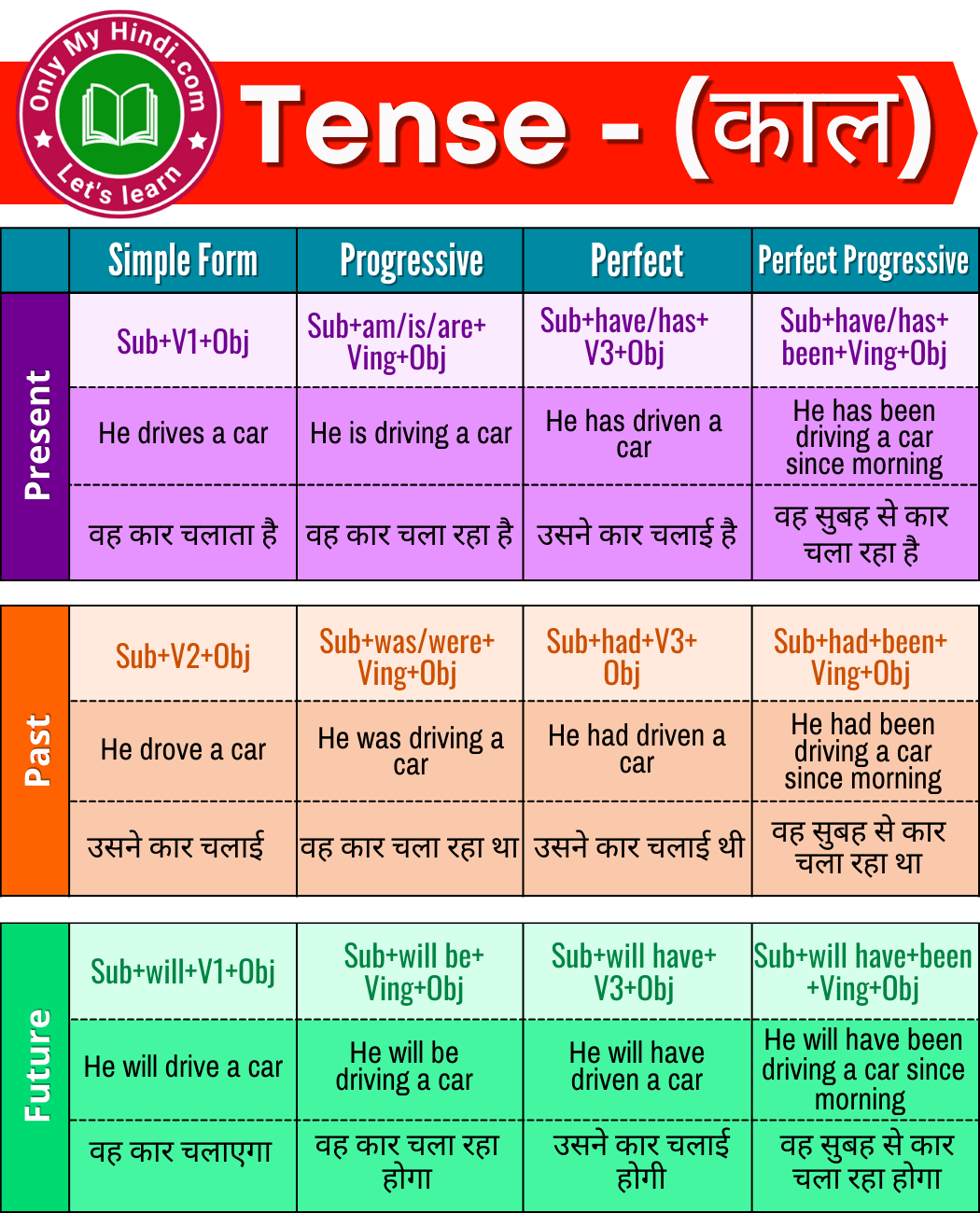क्या आप ढूंढ रहे हैं Future Perfect Tense in Hindi with Rules, Exercise and Examples? यहां पर हमने आपको सरल भाषा में समझाया है की Future Perfect Tense क्या होता है, और हम इसे किस तरह से इस्तेमाल कर सकते है।
Future Perfect Tense in Hindi
‘Future Perfect Tense’ को हम हिंदी में ‘पूर्ण भविष्य काल’ अथवा ‘भविष्य पूर्ण काल’ कहते हैं। इस Tense में उपयोग होने वाले वाक्यों से हमें यह पता चलता है की जो कार्य हो रहा है वो भविष्य काल में किसी समय में अथवा समय से पूर्व ही पूर्ण हो चूका है। इस tense के वाक्यों में भविष्य काल में काम का पूरा हो जाना पाया जाता है।
Future Perfect Tense की पहचान
‘Future Perfect Tense’ को हम किस तरह पहचान सकते हैं?
हिंदी वाक्यों के अंत में ‘चुकेगा’, ‘चुकेगी, ‘चुकेंगे’, ‘चुकूँगा’, ‘चूका होगा / होंगा’, ‘चुकी होगी /होंगी’, चुके होंगे’ आदि शब्द आते हैं आदि जैसे शब्द आते हैं तो उस वाक्य को हम Future Perfect Tense Sentence (पूर्ण भविष्य काल के वाक्य) कहते हैं।
Future Perfect Tense के अंग्रेजी वाक्यों में helping verb ‘will have’ का उपयोग होता है जो भविष्य काल को प्रस्तुत करता है और इन वाक्यों में जो verb का प्रयोग होता है वह verb का third form होता है, यह कार्य के पूर्णता को दर्शाता हैं।
Formula: Subject + will have + verb (ed / third form) + Object.

Future Perfect Tense Examples in Hindi
- He will have come to enjoy the tour.
वह दौरे का आनंद लेने आया होगा।
- We will have done our project.
हमने अपना प्रोजेक्ट कर चुके होंगे।
- We will have qualified in the tournaments.
हम टूर्नामेंट में क्वालीफाई कर चुके होंगे।
- She will have paid all her credit bills.
वह अपने सभी क्रेडिट बिलों का भुगतान कर चूका होगा।
- He will have allowed me to sell my products.
वे मुझे अपने उत्पाद बेचने की अनुमति दे दिए होंगे।
Types of Future Perfect Tense in Hindi
Future Perfect Tense के वाक्यों के कुल तीन प्रकार होते हैं।
- Affirmative sentence (सकारात्मक वाक्य)
- Negative sentence (नकारात्मक वाक्य)
- Interrogative sentence (प्रश्नवाचक वाक्य)
Affirmative Sentence
‘Affirmative sentence’ of Future Perfect tense पूर्ण भविष्य काल के सामान्य सकारात्मक वाक्य है जो के सकारात्मक तरीके से पूर्ण होने का संदेश देते हैं।
Affirmative sentence की रचना:
Formula: Subject + will have + verb (ed / third form) + Object.
Examples,
- Boys will have prepared for the examination.
लड़के परीक्षा की तैयारी कर चुके होंगे।
- My brother will have gone to the gym.
मेरा भाई जिम चला गया होगा।
- She will have eaten all the ice creams.
वह सारी आइसक्रीम खा चुकी होगी।
- He will have fallen on the floor.
वह फर्श पर गिर गया होगा।
- The roller coaster will have turned down from the track.
रोलर कोस्टर ट्रैक से नीचे उतर चुका होगा।
Negative Sentence
‘Negative sentence’ of Future Perfect tense पूर्ण भविष्य काल के सामान्य नकारात्मक वाक्य है जो किसी पूर्ण हुए कार्य को नकारात्मक तरीके से दर्शाते हैं।
इन वाक्यों में जो helping verb है उनके साथ not का इस्तेमाल होता है जो नकारात्मकता को दर्शाता हैं।
Negative sentence की रचना:
Formula: Subject + will + not + have+ verb (ed / third form) + Object.
Examples,
- Boys will not have prepared for the examination.
लड़कों ने परीक्षा की तैयारी नहीं किये होंगे।
- My brother will not have gone to the gym.
मेरा भाई जिम नहीं गया होगा।
- She will not have eaten all the ice creams.
उसने सारी आइसक्रीम नहीं खाई होगी।
- He will not have fallen on the floor.
वह फर्श पर नहीं गिरा होगा।
- The roller coaster will not have turned down from the track.
रोलर कोस्टर ट्रैक से नीचे नहीं उतरा होगा।
Interrogative Sentence
‘Interrogative sentence’ of Future Perfect tense पूर्ण भविष्य काल के सामान्य प्रश्नात्मक वाक्य है जो भविष्य में किसी पूर्ण हुए कार्य को प्रश्नात्मक तरीके से पूछ सकते हैं।
प्रश्नात्मक वाक्य helping verbs से शुरू होता है और अंत में Question mark से ख़त्म होता है जो प्रश्नात्मकता को दर्शाता है।
Interrogative sentence की रचना:
Formula: Will + Subject + have + verb (ed / third form) + object + ?
Wh word + Will + Subject + have + verb (ed / third form) + object + ?
Will + Subject +have + not + verb (ed / third form) + object + ?
Wh word + Will + Subject + have + not + verb (ed / third form) + object + ?
Examples,
- Will boys have prepared for the examination?
क्या लड़के परीक्षा की तैयारी कर चुके होंगे?
- Will my brother have gone to the gym?
क्या मेरा भाई जिम चला गया होगा?
- How will she have eaten all the ice creams?
उसने सारी आइसक्रीम कैसे खा ली होगी?
- Why will he have fallen on the floor?
वह फर्श पर क्यों गिर गया होगा?
- Will the roller coaster have turned down from the track?
क्या रोलर कोस्टर पटरी से उतर चुका होगा?
- Will boys have not prepared for the examination?
क्या लड़के परीक्षा की तैयारी नहीं कर चुके होंगे?
- Will my brother have not gone to the gym?
क्या मेरा भाई जिम नहीं चला गया होगा?
- How will she have not eaten all the ice creams?
वह सभी आइसक्रीम कैसे नहीं खा चुकी होगी?
- Why will he have not fallen on the floor?
वह फर्श पर क्यों नहीं गिरा होगा?
- Will the roller coaster have not turned down from the track?
क्या रोलर कोस्टर पटरी से नीचे नहीं उतरा होगा?
Future Perfect Tense Sentences in Hindi
For Affirmative sentences,
- We will have come to your wedding celebration.
हम आपकी शादी के जश्न में आए होंगे।
- Ganesh will have gone to the picnic.
गणेश पिकनिक पर गया होगा।
- The pandemic will have frustrated everyone.
महामारी ने सभी को निराश कर दिया होगा।
- She will have learned to be aware of strangers.
उसने अजनबियों से अवगत होना सीख लिया होगा।
- Boys will have checked the hotel rooms.
लड़कों ने होटल के कमरों की जाँच की होगी।
- The husband will have identified her partner.
पति ने अपने साथी की पहचान कर ली होगी।
- The man will have focused on a particular goal.
आदमी ने एक विशेष लक्ष्य पर ध्यान केंद्रित किया होगा।
- His girl will have cleared the entrance tests.
उसकी लड़की ने प्रवेश परीक्षा पास कर ली होगी।
- Ankush will have invited us to his party.
अंकुश ने हमें अपनी पार्टी में बुलाया होगा।
- The teacher will have informed all the staff members.
शिक्षक ने सभी स्टाफ सदस्यों को सूचित किया होगा।
For Negative sentences,
- We will not have come to your wedding celebration.
हम आपकी शादी के जश्न में नहीं आए होंगे।
- Ganesh will not have gone to the picnic.
गणेश पिकनिक पर नहीं गया होगा।
- The pandemic will not have frustrated everyone.
महामारी ने सभी को निराश नहीं किया होगा।
- She will not have learned to be aware of strangers.
उसने अजनबियों से अवगत होना नहीं सीखा होगा।
- Boys will not have checked the hotel rooms.
लड़कों ने होटल के कमरों की जाँच नहीं किये होंगे।
- The husband will not have identified her partner.
पति ने अपने साथी की पहचान नहीं की होगी।
- The man will not have focused on a particular goal.
आदमी ने किसी विशेष लक्ष्य पर ध्यान केंद्रित नहीं किया होगा।
- His girl will not have cleared the entrance tests.
उसकी लड़की ने प्रवेश परीक्षा पास नहीं की होगी।
- Ankush will not have invited us to his party.
अंकुश ने हमें अपनी पार्टी में नहीं बुलाया होगा।
- The teacher will not have informed all the staff members.
शिक्षक ने सभी स्टाफ सदस्यों को सूचित नहीं किया होगा।
For Interrogative sentences,
(Interrogative Affirmative sentences)
- Will we have come to your wedding celebration?
क्या हम आपकी शादी के जश्न में आए होंगे?
- Will Ganesh have gone to the picnic?
क्या गणेश पिकनिक पर गया होगा?
- How will the pandemic have frustrated everyone?
महामारी ने सभी को कैसे निराश किया होगा।
- Where will she have learned to be aware of strangers?
उसने अजनबियों के प्रति जागरूक होना कहाँ से सीखा होगा?
- How will boys have checked the hotel rooms?
लड़कों ने होटल के कमरों की जाँच कैसे किये होंगे?
- Why will the husband have identified her partner?
पति ने अपने साथी की पहचान क्यों की होगी?
- Will the man have focused on a particular goal?
क्या आदमी ने किसी विशेष लक्ष्य पर ध्यान केंद्रित किया होगा?
- Will her girl have cleared the entrance tests?
क्या उसकी लड़की ने प्रवेश परीक्षा पास कर ली होगी?
- Why will Ankush have invited us to his party?
अंकुश ने हमें अपनी पार्टी में क्यों बुलाया होगा?
- Will the teacher have informed all the staff members?
क्या शिक्षक ने सभी स्टाफ सदस्यों को सूचित कर दिया होगा?
(Interrogative Negative sentences)
- Will we haven’t come to your wedding celebration?
क्या हम आपकी शादी के जश्न में नहीं आए होंगे?
- Will Ganesh have not gone to the picnic?
क्या गणेश जी पिकनिक पर नहीं गए होंगे ?
- How will the pandemic haven’t frustrated everyone?
महामारी ने सभी को निराश कैसे नहीं किया होगा?
- Where will she have not learned to be aware of strangers?
उसने अजनबियों के प्रति जागरूक होना कहाँ नहीं सीखा होगा?
- How will boys have not checked the hotel rooms?
लड़कों ने होटल के कमरों की जाँच कैसे नहीं की होगी?
- Why will the husband have not identified her partner?
पति ने अपने साथी की पहचान क्यों नहीं की होगी?
- Will the man have not focused on a particular goal?
क्या आदमी ने किसी विशेष लक्ष्य पर ध्यान केंद्रित नहीं किया होगा?
- Will her girl have not cleared the entrance tests?
क्या उसकी लड़की ने प्रवेश परीक्षा पास नहीं की होगी?
- Why will Ankush have not invited us to his party?
अंकुश ने हमें अपनी पार्टी में क्यों नहीं बुलाया होगा?
- Will the teacher have not informed all the staff members?
क्या शिक्षक ने सभी स्टाफ सदस्यों को सूचित नहीं किया होगा?
Future Perfect Tense Exercises in Hindi
- The vacancies _________ for fresh people. (require)
- He _________ by the huge noise. (not disturb)
- How_____ he _________ his wife’s birthday? (forget)
- She _________ by the whole team. (encourage)
- The president _________ a new rule. (release)
- Where ___ he _______ by this time? (go)
- Everyone _________ on time. (not gather)
- She _________ us in the darkness. (watch)
- What _____ she _________ in the court? (confess)
- She ___________ with human psychology. (not experience)
Answers
- The vacancies will have required for fresh people. (require)
- He will not have disturbed by the huge noise. (not disturb)
- How will he have forgotten his wife’s birthday? (forget)
- She will have encouraged by the whole team. (encourage)
- The president will have released a new rule. (release)
- Where will he have gone by this time? (go)
- Everyone will not have gathered on time. (not gather)
- She will have watched us in the darkness. (watch)
- What will she have confessed in front of the Police? (confess)
- She will not have experienced with human psychology. (not experience)
More Tenses


